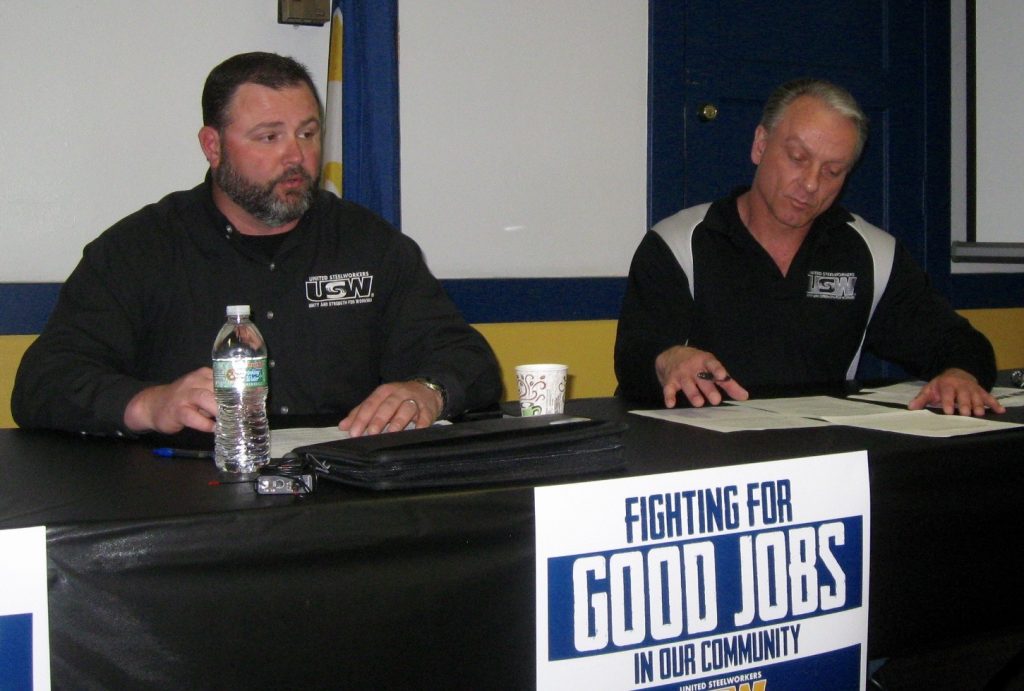Steel delegation reports progress in Washington


Granite City, IL – Venturing off to Washington D.C. to try to get cooperation on trade matters has always seemed like a fool’s errand, replete with hostile politicians, clueless bureaucrats and impenetrable legalities.
But the Metro East union leaders and public officials who were in Washington last week got a better welcome than that, and they shared their experience at a press conference on Friday at the Granite City Labor Temple.
Two United Steelworkers local presidents, Jason Chism of Local 50 and Dan Simmons of Local 1899, were joined by Granite City Mayor Ed Hagnauer and Madison County Board Chairman Alan Dunstan for a whirlwind tour that included meetings with U.S. senators and representatives and – perhaps more importantly – staff at the Department of Commerce.
On Tuesday, Feb. 23, in particular, the group of four were in round-the clock meetings. What they found were some pleasant surprises – the people at Commerce were keenly interested in the situation at Granite City Steel and determined to help, and even the region’s Republicans in Congress were signed on to toughen U.S. trade laws and see that they are enforced.
The result could be a growing trend toward fighting back against the dumping and unfair duties by subsidized foreign steelmakers that have forced the current idling of Granite City Steel, after many decades of ignoring such problems in hopes they would go away on their own. Action on another big issue, currency manipulation, is at least being talked about.
“I think most of the members up here will tell you that was a very productive meeting,” said Dunstan, leader of the delegation. “We want to thank our Congressional delegation for coming up with tools that are going to help us solve this problem. Now that the Department of Commerce has the tools, it must do its job. It needs to be aggressive and timely. Any delay or inefficient implementation of trade remedies results in prolonged injury to domestic steel producers and workers.”
Three major steel cases are now before the International Trade Commission. One, involving corrosion resistant steel, led to a preliminary finding of dumping and countervailing duties on Dec. 22 against China, India, Vietnam and others.
That decision, panel members said, has already given a boost to some steel prices. “That preliminary finding alone probably helped save 140 workers at Granite City Steel from being laid off,” Dunstan said. “That’s how this works.”
A preliminary decision is due Feb. 29 on a case involving cold-rolled steel and the third decision, concerning hot-rolled steel, is due March 14 – pretty quick work considering the history of U.S. trade enforcement.
Also key is a new law, the American Trade Facilitation and Enforcement Act, passed by Congress and just signed on Wednesday by President Obama. It should help speed up the pace of taking action in trade cases, and is in partn a result of local officials traveling to Washington for similar meetings a year ago.
Simmons noted that under the old law, it took three years of “harm and devastation” before Americans could even file for relief against unfair trade practices.
“Now, if you even suspect harm and devastation, you can file a case,” he said. “You don’t have to wait and let harm happen.”
WHAT IT’S LIKE
The people at Commerce were interested when the delegation members described how people are being affected by the current steel glut caused largely by foreign subsidies.
“We have folks who have been out there a long time, with no unemployment extensions, trying to find a job and support their families,” Chism said. “Dan and I have members who come to our local union halls because they don’t know where to go to make ends meet. It’s been a struggle and it’s continuing.”
Hagnauer, too, described the local scene at the meeting with Commerce.
“I felt it was my job to reach out to them and let them know what it feels like to sit in my office, look out the window and see these Steelworkers who are going to these meetings at the township hall,” he said. “As you watch them leave these meetings, with tears in their eye, their families are upset.”
“These guys in the department just do their jobs. They don’t really know what the impact is on the community. We made that very clear to them – we made it clear that they need to be more aggressive in what they do.”


